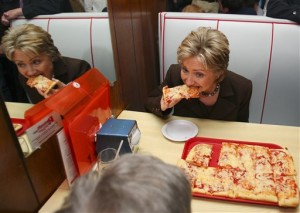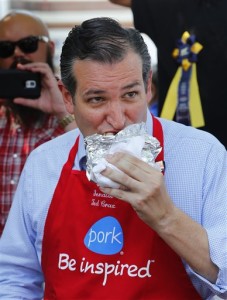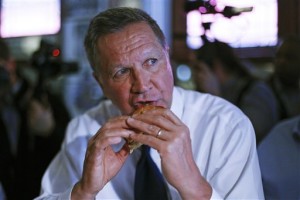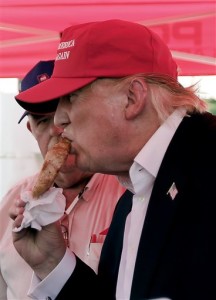
Democratic presidential hopeful, Sen. Hillary Rodham Clinton, D-N.Y., eats pizza during a lunch stop at Revello’s Cafe Pizzeria, while campaigning in Old Forge, Penn., Monday, March 10, 2008. (AP Photo/Carolyn Kaster)
From immigration reform to national security to affirmative action, this year’s presidential candidates have battled over a variety of important issues. But our nation’s food system—one of the most crucial components for a functioning society—has been left out of the conversation.

Republican presidential candidate, Sen. Ted Cruz, R-Texas, eats a pork chop at the Iowa State Fair, Friday, Aug. 21, 2015, in Des Moines, Iowa. (AP Photo/Paul Sancya)

Republican presidential candidate, former Ohio Gov. John Kasich, takes a bite out of a fish sandwich for lunch at the Original Oyster House restaurant in downtown Pittsburgh, Tuesday, April 19, 2016. (AP Photo/Gene J. Puskar)
“Both parties get away with not addressing hunger, because it’s one of those problems hidden in plain sight—the poor are not an ‘out and proud’ population, like LGBT voters, for example,” said Lori Silverbush, the director and producer of “A Place at the Table”, a 2012 documentary that investigates hunger in America. “They don’t vote as a bloc, and are usually far busier surviving than engaging in the political process, so it’s no surprise that our politicians don’t waste a lot of time talking about their issues.”
A coalition of national food advocacy groups, including Food Policy Action and the Union of Concerned Scientists, have banded together around “a call to action on food and farms.” Called Plate of the Union, the group has set up a website which features a petition urging candidates to “take bold steps to reform our food system to make sure every American has equal access to healthy, affordable food that is fair to workers, good for the environment and keeps farmers on the land.” Silverbush’s husband, chef Tom Colicchio, best known as a celebrity judge on Top Chef, is also a prominent food activist and one of the principal members behind the Plate of the Union initiative.

Republican presidential candidate Donald Trump eats a pork chop on a stick at the Iowa State Fair Saturday, Aug. 15, 2015, in Des Moines. (AP Photo/Charlie Riedel)

Democratic presidential candidate, Sen. Bernie Sanders, I-Vt. orders lunch at Key’s Cafe, Friday, Feb. 12, 2016, in St. Paul, Minn. (AP Photo/Evan Vucci)
Activists like Silverbush hope that the candidates will focus on several key issues:
- Make fresh fruits and vegetables more affordable and easily accessible
- Cap processed-food subsidies
- Monitor pollution and delay climate change
- Raise wages for food workers and their families
- Address the spiking rates of obesity and diet-related diseases that cost upwards of $190 billion healthcare dollars each year, according to a study in the Journal of Health Economics
“I think it’s incredibly important that our candidates address issues of hunger and food policy because our government should represent all Americans, especially the hungriest and most disenfranchised, as they are the ones that need it the most,” Silverbush said. “Wealthy voters and powerful corporations seem to be doing just fine getting their needs met.”
But policy implementation is not straightforward—and for the most part, has barely merited a mention by any of the candidates. In fact, as the Huffington Post reported a few weeks ago, the candidates have not responded to any requests—from journalists and activists—to outline their food plans.
Here is what what the candidates have said, at town halls, in interviews and debates, and in legislative votes. None of the campaign offices responded to multiple requests for comment. –Raquel Wildes and Lindsay Purcell
| Hillary Clinton | Bernie Sanders | Ted Cruz | John Kasich | Donald Trump | |
| Nutrition | Has not spoken publicly about nutrition policies in this election season, but in 2010, Clinton received an award for leadership in the fight against hunger with the World Food Programme, the UN’s food assistance branch. | Has supported legislation in favor of improved nutrition, including: the Summer Meals Act of 2014, the Local Farms, Food, and Jobs Act of 2013, and the Growing Safe Food Act of 2009. | Has not yet articulated a nutrition policy, but disagrees with the Obama administration’s efforts to reform school lunches: “To any school-age kids, if Heidi’s first lady, french fries are coming back to the lunchroom.” | Has not articulated a nutrition platform; his wife Karen Kasich has adopted healthy eating for children as a platform as Ohio First Lady. | Has not articulated a position on nutrition. |
| Supplemental Nutrition Assistance Program (SNAP) | Wants to double funding for the Farmers Market Promotion and the Local Food Promotion programs to expand food hubs, farmers markets, and SNAP recipients’ access to fresh food.Sponsored the “Farm-to-Fork” initiative, which links upstate farmers with markets. | Supports SNAP assistance for anyone who needs it, and helped pass the 2014 Farm Bill, which included increased funding for SNAP. | Opposed the 2014 Farm Bill on the basis that it provided too much support for SNAP. Would reform all public welfare programs, including food stamps. |
Co-sponsored the 1996 Welfare Reform Bill that put time limits on how long recipients could receive food stamp aid, causing millions of Americans to lose SNAP benefits. This provision recently went back into effect in New York State. | Does not support SNAP as a permanent solution.“When half of food stamp recipients have been on the dole for nearly a decade, something is clearly wrong, and some of it has to do with fraud.” |
| Farm Subsidies | Believes in supporting small farmers. Hopes to broaden access to capital for rural businesses, expand the New Markets Tax Credit, increase education funding for the next generation of farmers, and create a national infrastructure bank to improve rural transportation, water, and broadband connection, among other reforms. |
Prioritizes innovative rural economic development. Has been active in keeping family farms in business, fighting for fair prices of goods, and encouraging access to healthy, local food. Fought particularly hard for Vermont’s dairy farms, supporting numerous bills for their aid. | Against farm subsidies across the board, including ethanol. | Named a “Friend of Agriculture” by the Ohio Farm Bureau. Eliminated the Death Tax, which can hamper farmers’ ability to hand down family farms. |
Does not have a platform addressing farm subsidies. Many commentators believe that his stance on immigration is bad for farmers as the lack of available labor would dramatically affect farm economies. |
| Environment | Wants to fully fund the Environmental Quality Incentives Program, providing assistance to producers who conserve and improve natural resources on their farms, in addition to increasing funding for other existing initiatives, such as the Regional Conservation Partnership Program, the Renewable Fuel Standard, the Rural Utilities Service and other USDA energy programs. | Supports major investments in renewable energy to combat global warming while simultaneously improving the farm economy, including making the Wind Production Tax Credit permanent and supporting the Renewable Fuels Standard.Hopes to expand rural broadband access in his Rebuild America Act, which will provide $12 billion per year to repair and improve the high-hazard dams across rural America. | Does not believe in climate change. | The only Republican candidate to acknowledge climate change. Does not think that government should pass regulations to prevent climate change if it impacts jobs. |
Does not recognize climate change. Believes regulating companies hurts jobs. |

Your Comments